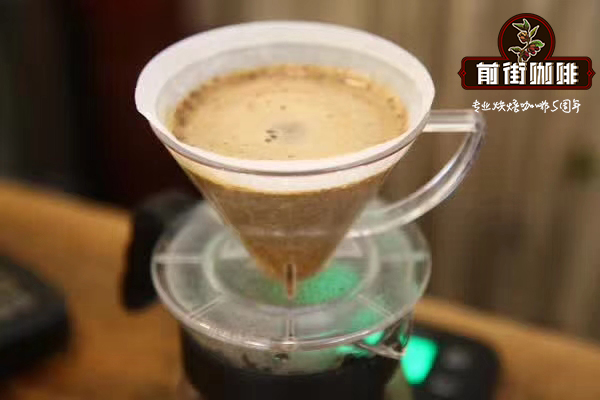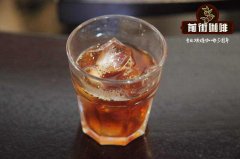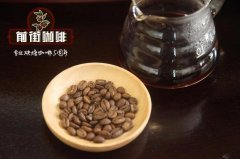What happens if the water temperature of coffee is too high? how bad is the effect of water temperature on the taste of coffee?

Professional coffee knowledge exchange more coffee bean information please follow the coffee workshop (Wechat official account cafe_style)
The violent degree of the thermal motion of the molecule is the temperature, and the water itself as the extraction medium, the temperature is the energy of water, and the energy promotes the molecular motion to accelerate. The higher the temperature of the water, the greater the energy.
But knowing the definition of water temperature is not enough for us to understand how to change the extraction rate of coffee. We also need to know how coffee beans are made:
Coffee is made up of different molecules, all of which are made up of atoms with electrons that rotate at a speed of 10 times the speed of light, so all molecules keep moving.
Macromolecules move more slowly, while small molecules such as aroma substances move more actively. The degree of movement will become more intense as the temperature increases, and the smaller the molecular size, the more frequent it will be.
Therefore, the greater the energy, the faster the coffee extraction. The more substances extracted in the same extraction time, the higher the extraction rate. As the temperature rises, the movement and collision of molecules will become more active, which will accelerate the change and extraction. Both flavor and aroma components can be fully dissolved at high temperature, while bitter substances with higher molecular weight need to take more time to release.
We know the material composition of coffee. But how does water interact with coffee?
Water molecules are basically the smallest and purest. Water forms hydrogen bonds with other molecules to cluster around and surround larger molecules, separating them from each other. When the separation is about the same, the phenomenon that the molecules surround the water molecule, we will say that the substance is dissolved in water.
As the temperature increases, water increases the mobility between molecules and increases its solubility. The degree of exercise will be intensified by the higher the temperature and the smaller the molecules. So when high-temperature water reacts with coffee, the high temperature will increase the solubility and produce more extraction to increase the yield.
Effect of Water temperature on Coffee production
What information can we get from the above? When other data are the same:
1. Low temperature water is not enough to bring out more sour and sweet substances.
2. Low temperature water can bring out less bitter substances.
3. The higher the temperature, the more bitter substances come out.
4. The higher the temperature, the more sweet and sour substances come out.
Therefore, we can understand that it is good to increase the temperature as long as the data of other factors remain unchanged, as long as it does not exceed the range that will increase excessive bitterness. This will bring out more sour and sweet substances, and the taste will be richer.
Common misunderstandings about water temperature
1. In coffee made from cold water, such as ice droplets and cold bubbles, is caffeine lower?
In the same unit time, the dissolution of caffeine is 2g/100ml in room temperature water and 66g/100ml in boiling water. But within the same unit of time. Cold-extracted coffee generally takes a long time to make (3-24 hours), while hot-extracted coffee usually takes a short time (20 seconds-4 minutes). Coupled with different kinds of beans and different extraction methods, cold-extracted coffee does not necessarily have less caffeine than hot-extracted coffee.
2. Will the coffee powder be scorched by using too high water temperature (for example, > 93 ℃)?
Coffee is too hard. Even light roasted coffee has to experience a high temperature of about 200 ℃ in the roaster, and as long as it is roasted, it will not make the coffee scorched (when there is a problem with roasting). Unexpectedly, it will be scorched by more than 90 degrees of water when it is made? It's too hard. If there is such a problem, it is recommended to change beans and merchants.
3. Deep baking should use lower water temperature to avoid too much bitterness.
Using a slightly lower water temperature does reduce the bitterness of deep-roasted coffee, but relatively less sweet and sour substances precipitate. In fact, deep baking can use higher temperatures, and to avoid more bitter substances, you only need to reduce the time. In doing so, the high temperature can increase the precipitation rate of sweet and sour substances, and the resulting coffee will taste fuller.
END
Important Notice :
前街咖啡 FrontStreet Coffee has moved to new addredd:
FrontStreet Coffee Address: 315,Donghua East Road,GuangZhou
Tel:020 38364473
- Prev

What is the appropriate water temperature for brewing coffee? how to control the water temperature of coffee to stabilize it?
For more information on coffee beans, please follow the coffee workshop (official Wechat account cafe_style) theoretically, the temperature of hot water in contact with coffee powder should be kept at 91-94 ℃ during brewing and extraction, which is called the best extraction water temperature. The temperature range of 91-94 ℃ means that if the water temperature is lower than this range, the coffee will show an obvious sour taste.
- Next

How many methods are there for the preservation of coffee beans | how long will the coffee beans remain unchanged?
Professional coffee knowledge exchange more coffee bean information please pay attention to the coffee workshop (Wechat official account cafe_style) coffee bean preservation: pay attention to fresh coffee beans like most food, the more fresh, the more authentic taste. So are coffee beans. The more fresh they are, the better the flavor is. It is not easy to buy high-quality coffee beans, you must not want to because of poor storage
Related
- Beginners will see the "Coffee pull flower" guide!
- What is the difference between ice blog purified milk and ordinary milk coffee?
- Why is the Philippines the largest producer of crops in Liberia?
- For coffee extraction, should the fine powder be retained?
- How does extracted espresso fill pressed powder? How much strength does it take to press the powder?
- How to make jasmine cold extract coffee? Is the jasmine + latte good?
- Will this little toy really make the coffee taste better? How does Lily Drip affect coffee extraction?
- Will the action of slapping the filter cup also affect coffee extraction?
- What's the difference between powder-to-water ratio and powder-to-liquid ratio?
- What is the Ethiopian local species? What does it have to do with Heirloom native species?

